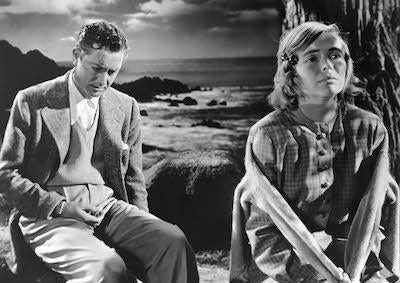In the 1940s, the vast majority of filmmakers working in Hollywood were men. This overwhelming statistic was upset by a handful of women who were able to break through as directors (Dorothy Arzner, active 1927-1943), screenwriters and producers. Along with Virginia Van Upp at Columbia and Joan Harrison at Universal, Harriet Parsons (1906-1983), the only daughter of famed gossip columnist Louella Parsons, was one of the very few women able to make her mark in the industry as a feature film producer during this decade.
Parsons got her start at Columbia creating newsreel-like “documentary” shorts in the 1930s, and, after years being denied on-screen credit for her labor, moved to Republic Pictures in 1940, where she produced their Meet the Stars series, for which she finally received both on-screen and behind-the-scenes recognition. Her uphill battle continued throughout her foray into features at RKO, where both The Enchanted Cottage (John Cromwell, 1945) and I Remember Mama (George Stevens, 1948) were nearly taken away from her by various men in charge. She would stay with RKO to produce a total of six feature films before the gender-based roadblocks that stood in her way became too much to bear; she gave up producing altogether in the mid-1950s, went back to ghostwriting her mother's column and moved in with her longtime partner Evelyn Farney, who she adopted as her daughter when both were in middle age as a cover for their lesbian relationship.
To highlight two milestones in her career, the Archive will screen Episode 1 of Meet the Stars, Chinese Garden Festival, before her landmark first feature as sole producer, The Enchanted Cottage, both on 35mm from the Archive's collection.
To celebrate Parsons’ life and career, this evening’s screening will be introduced by Karina Longworth, writer, producer and narrator of the You Must Remember This podcast. Their season “Gossip Girls: Hedda Hopper & Louella Parsons” premiered July 1, 2021 and dedicates Episode 5, titled “The Queer, Female Film Producer You’ve Never Heard Of,” to Harriet Parsons’ life and career.
Meet the Stars #1: Chinese Garden Festival
U.S., 1941
Hollywood stars gather at the famed Pickfair estate for a garden party to raise funds for a war-torn China.
35mm, b&w, 11 min. Director/Producer: Harriet Parsons. With: Harriet Parsons, Mary Pickford, Barbara Jo Allen, Kay Aldridge, William Bakewell.
The Enchanted Cottage
U.S., 1945
For her first feature film producing project, Parsons tapped screenwriter DeWitt Bodeen (Cat People, 1942; The Seventh Victim, 1943) to adapt the 1921 Arthur Pinero play of the same name for RKO. At the time, Parsons was in a marriage of convenience to King Kennedy; Bodeen, who moved in with his longterm male partner in 1950, may not have been transparently out in 1940s America, but the two collaborators understood each other, as well as the torment of leading a double life during a period when homosexuality was illegal in certain parts of the country. The duo imbue this pain into their romantic story of disfigured war veteran Oliver Bradford (Robert Young) who finds love with plain housekeeper Laura Pennington (Dorothy McGuire) after falling under the spell of an enchanted English cottage that renders them blind to each other's physical shortcomings. Parson's bold choice to set the adaptation during WWII while fighting was still raging on various fronts is a tribute to her sensitivity to the lasting impact of combat on veterans, a stance that fell in direct contrast to her mother Louella's right-leaning, less humanistic politics. Her first producing triumph was nearly never Harriet's to celebrate: after she pitched the project to RKO, it was taken out of her hands and given to the more-established Dudley Nichols (Bringing Up Baby, 1938). It was only in reaction to Hedda Hopper's (her mother's sometimes rival) scathing editorial accusing RKO of gender bias that the studio relented and gave her full producorial control over the picture.
35mm, b&w, 92 min. Producer: Harriet Parsons. Director: John Cromwell. Screenwriters: DeWitt Bodeen, Herman J. Mankiewicz. With: Dorothy McGuire, Robert Young, Herbert Marshall, Midred Natwick, Spring Byington.






 Mobile Navigation
Mobile Navigation

